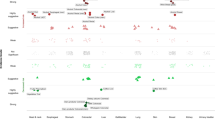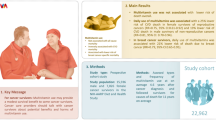Abstract
Background/Objectives:
To determine whether general dietary supplement use is associated with cancer risk in UK women and to estimate risks related to use at one and two recording points.
Subjects/Methods:
Cox’s proportional hazard regression models were used to estimate cancer risks for 32 665 middle-aged women in the UK Women’s Cohort Study relating to any current supplement use recorded in a baseline questionnaire. During a median follow-up of 15 years, there were 3936 registered cancer incidences, including 1344 breast, 429 smoking-related and 362 colorectal cancers. Cancer risks for 12 948 of these women, who also completed questionnaires on average 4.4 years later, were estimated in relation to any supplement use at both time points (1527 cancers, including 561 breast, 131 smoking-related and 141 colorectal cancers). Adjustments were made for baseline confounders.
Results:
Total smoking-related cancers were associated with baseline supplement use (hazard ratio (HR)=1.41, 95% confidence interval (CI): 1.10, 1.81) compared with non-use, but not associated with use at both recording points (HR=1.29; 95% CI: 0.78, 2.13) compared with use at neither. There was no evidence of the associations between total, colorectal or breast cancers and baseline supplement use, or use at both recording points. In sub-analyses, no significant associations with breast cancer were found for premenopausal or postmenopausal baseline users, or similarly for use at both points (HR=1.35, 95% CI: 0.91, 2.01; and HR=0.93, 95% CI: 0.68, 1.26, respectively).
Conclusions:
There was evidence that general supplement use was associated with increased smoking-related cancer risk, but there was no evidence of associations with total, colorectal and breast cancers.
This is a preview of subscription content, access via your institution
Access options
Subscribe to this journal
Receive 12 print issues and online access
$259.00 per year
only $21.58 per issue
Buy this article
- Purchase on Springer Link
- Instant access to full article PDF
Prices may be subject to local taxes which are calculated during checkout
Similar content being viewed by others
References
Bates B, Lennox A, Swan G . The National Diet & Nutrition Survey: Headline results from Year 1 of the Rolling Programme (2008/2009). FSA: London, 2009.
Neuhouser ML, Patterson RE, Levy L . Motivations for using vitamin and mineral supplements. J Am Diet Assoc 1999; 99: 851–854.
WCRF/AICR. Food, Nutrition, Physical Activity, and the Prevention of Cancer: a Global Perspective. AICR: Washington, DC, 2007.
Albanes D, Heinonen OP, Taylor PR, Virtamo J, Edwards BK, Rautalahti M et al. Alpha-tocopherol and beta-carotene supplements and lung cancer incidence in the alpha-tocopherol, beta-carotene cancer prevention study: effects of base-line characteristics and study compliance. J Natl Cancer Inst 1996; 88: 1560–1570.
Omenn GS, Goodman GE, Thornquist MD, Balmes J, Cullen MR, Glass A et al. Effects of a combination of beta carotene and vitamin a on lung cancer and cardiovascular disease. N Engl J Med 1996; 334: 1150–1155.
Macpherson H, Pipingas A, Pase MP . Multivitamin-multimineral supplementation and mortality: a meta-analysis of randomized controlled trials. Am J Clin Nutr 2013; 97: 437–444.
Gaziano JM, Sesso HD, Christen WG, Bubes V, Smith JP, MacFadyen J et al. Multivitamins in the prevention of cancer in men: The Physicians' Health Study II randomized controlled trial. JAMA 2012; 308: 1871–1880.
Hercberg S, Czernichow S, Galan P . Antioxidant vitamins and minerals in prevention of cancers: lessons from the SU.VI.MAX study. Br J Nutr 2006; 96: S28–S30.
Neuhouser ML, Wassertheil-Smoller S, Thomson C, Aragaki A, Anderson GL, Manson JE et al. Multivitamin use and risk of cancer and cardiovascular disease in the Women's Health Initiative Cohorts. Arch Intern Med 2009; 169: 294–304.
Park S-Y, Murphy SP, Wilkens LR, Henderson BE, Kolonel LN . Multivitamin use and the risk of mortality and cancer incidence. Am J Epidemiol 2011; 173: 906–914.
Slatore CG, Littman AJ, Au DH, Satia JA, White E . Long-term use of supplemental multivitamins, vitamin C, vitamin E, and folate does not reduce the risk of lung cancer. Am J Respir Crit Care Med 2008; 177: 524–530.
Hutchinson J, Burley VJ, Greenwood DC, Thomas JD, Cade JE . High-dose vitamin C supplement use is associated with self-reported histories of breast cancer and other illnesses in the UK Women’s Cohort Study. Public Health Nutr 2011; 14: 768–777.
Li K, Kaaks R, Linseisen J, Rohrmann S . Consistency of vitamin and/or mineral supplement use and demographic, lifestyle and heath-status predictors: findings from the European Prospective Investigation into Cancer and Nutrition (EPIC)-Heidelberg cohort. Br J Nutr 2010; 104: 1058–1064.
Hara A, Sasazuki S, Inoue M, Shimazu T, Iwasaki M, Sawada N et al. Use of vitamin supplements and risk of total cancer and cardiovascular disease among the Japanese general population: a population-based survey. BMC Public Health 2011; 11: 540.
Li K, Kaaks R, Linseisen J, Rohrmann S . Vitamin/mineral supplementation and cancer, cardiovascular, and all-cause mortality in a German prospective cohort (EPIC-Heidelberg). Eur J Nutr 2011; 51: 407–413.
Batty GD, Kivimaki M, Gray L, Davey Smith G, Marmot MG, Shipley MJ . Cigarette smoking and site-specific cancer mortality: testing uncertain associations using extended follow-up of the original Whitehall study. Ann Oncol 2008; 19: 996–1002.
Vineis P, Alavanja M, Buffler P, Fontham E, Franceschi S, Gao YT et al. Tobacco and cancer: recent epidemiological evidence. J Natl Cancer Inst 2004; 96: 99–106.
Cade JE, Burley VJ, Greenwood DC The UKWCS Steering Group. The UK Women's Cohort Study: comparison of vegetarians, fish-eaters and meat-eaters. Public Health Nutr 2004; 7: 871–878.
Cade JE, Burley VJ, Greenwood DC, The UKWCS Steering Group. Dietary fibre and risk of breast cancer in the UK Women's Cohort Study. Int J Epidemiol 2007; 36: 431–438.
Taylor EF, Burley VJ, Greenwood DC, Cade JE . Meat consumption and risk of breast cancer in the UK Women's Cohort Study. Br J Cancer 2007; 96: 1139–1146.
Cade JE, Burley VJ, Greenwood DC . Dietary fibre and risk of breast cancer in the UK Women's Cohort Study. Int J Epidemiol 2007; 36: 431–438.
Harrison RA, Holt D, Pattison DJ, Elton PJ . Are those in need taking dietary supplements? a survey of 21,923 adults. Br J Nutr 2004; 91: 617–623.
Kirk SFL, Cade JE, Barrett JH, Conner M . Diet and lifestyle characteristics associated with dietary supplement use in women. Public Health Nutr 1999; 2: 69–73.
McNaughton SA, Mishra GD, Paul AA, Prynne CJ, Wadsworth MEJ . Supplement use is associated with health status and health-related behaviors in the 1946 British birth cohort. J Nutr 2005; 135: 1782–1789.
Brownie S . Characteristics of older dietary supplement users: review of the literature. Australas J Ageing 2005; 24: 77–87.
Frank E, Bendich A, Denniston M . Use of vitamin-mineral supplements by female physicians in the United States. Am J Clin Nutr 2000; 72: 969–975.
Lyle BJ, Mares-Perlman JA, Klein BEK, Klein R, Greger JL . Supplement users differ from nonusers in demographic, lifestyle, dietary and health characteristics. J Nutr 1998; 128: 2355–2362.
Patterson RE, Neuhouser ML, White E, Hunt JR, Kristal AR . Cancer-related behavior of vitamin supplement users. Cancer Epidemiol Biomarkers Prev 1998; 7: 79–81.
Reinert A, Rohrmann S, Becker N, Linseisen J . Lifestyle and diet in people using dietary supplements. a German cohort study. Eur J Nutr 2007; 46: 165–173.
Shikany JM, Patterson RE, Agurs-Collins T, Anderson G . Antioxidant supplement use in Women's Health Initiative participants. Prev Med 2003; 36: 379–387.
Touvier M, Kesse E, Clavel-Chapelon F, Boutron-Ruault M-C . Dual association of β-carotene with risk of tobacco-related cancers in a cohort of french women. J Nati Cancer Inst 2005; 97: 1338–1344.
Palozza P, Serini S, Trombino S, Lauriola L, Ranelletti FO, Calviello G . Dual role of β-carotene in combination with cigarette smoke aqueous extract on the formation of mutagenic lipid peroxidation products in lung membranes: dependence on pO2. Carcinogenesis 2006; 27: 2383–2391.
Tanvetyanon T, Bepler G . Beta-carotene in multivitamins and the possible risk of lung cancer among smokers versus former smokers. Cancer 2008; 113: 150–157.
Chan ALF, Leung HWC, Wang SF . Multivitamin supplement use and risk of breast cancer: a meta-analysis. Ann Pharmacother 2011; 45: 476–484.
Lee JE, Willett WC, Fuchs CS, Smith-Warner SA, Wu K, Ma J et al. Folate intake and risk of colorectal cancer and adenoma: modification by time. Am J Clin Nutr 2011; 93: 817–825.
Ewertz M, Gill C . Dietary factors and breast cancer risk in Denmark. Int J Cancer 1990; 46: 779–784.
Moorman PG, Ricciuti MF, Millikan RC, Newman B . Vitamin supplement use and breast cancer in a North Carolina population. Public Health Nutr 2001; 4: 821–827.
Lee MM, Chang IYH, Horng CF, Chang JS, Cheng SH, Huang A . Breast cancer and dietary factors in Taiwanese women. Cancer Causes Control 2005; 16: 929–937.
Qiao Y-L, Dawsey SM, Kamangar F, Fan J-H, Abnet CC, Sun X-D et al. Total and cancer mortality after supplementation with vitamins and minerals: follow-up of the Linxian General Population Nutrition Intervention Trial. J Natl Cancer Inst 2009; 101: 507–518.
GfK Social Research. Consumer consumption of vitamin and mineral food supplements: Random Location Omnibus Survey 2008. London, UK.
Acknowledgements
The UK Women’s Cohort Study was conceived and designed by JEC and the creation was funded by the World Cancer Research Fund. JH conducted the analysis for this manuscript, wrote the first version and contributed to all other versions. DCG provided statistical advice. All authors contributed to the design of the analysis and to the write-up.
Author information
Authors and Affiliations
Corresponding author
Ethics declarations
Competing interests
The authors declare no conflict of interest.
Rights and permissions
About this article
Cite this article
Hutchinson, J., Burley, V., Greenwood, D. et al. General supplement use, subsequent use and cancer risk in the UK Women’s Cohort Study. Eur J Clin Nutr 68, 1095–1100 (2014). https://doi.org/10.1038/ejcn.2014.85
Received:
Revised:
Accepted:
Published:
Issue Date:
DOI: https://doi.org/10.1038/ejcn.2014.85
This article is cited by
-
Trends in vitamin, mineral and dietary supplement use in Switzerland. The CoLaus study
European Journal of Clinical Nutrition (2017)



